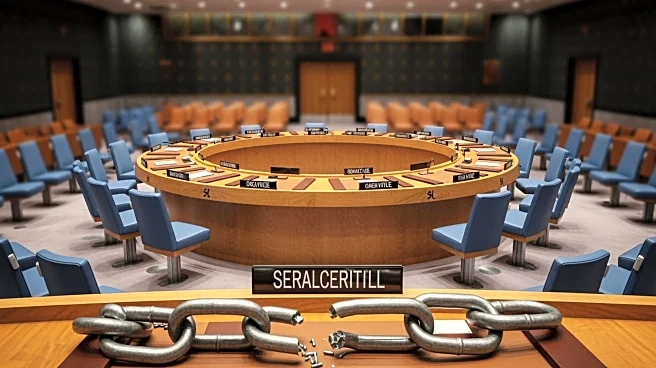What's Happening?
The United Nations Security Council has renewed sanctions against the Houthi rebels in Yemen, condemning their cross-border and maritime attacks. The resolution, adopted with a 13-0 vote, calls for an end
to actions against infrastructure and civilian targets. China and Russia abstained from the vote. The sanctions, which include asset freezes and travel bans, are extended until November 14, 2026, targeting high-ranking Houthi officials and the group as a whole. The resolution also urges member states to enhance efforts to implement an arms embargo and combat the smuggling of weapons and components. The Houthis have controlled significant portions of Yemen, including the capital Sanaa, for over a decade, contributing to the country's humanitarian crisis.
Why It's Important?
The renewal of sanctions against the Houthi rebels is significant as it aims to curb their military capabilities and reduce attacks that have destabilized the region. The sanctions are intended to deter violations of the arms embargo, which could help in reducing the conflict's impact on civilian populations and infrastructure. The United States and France expressed disappointment that the resolution was not more ambitious, highlighting concerns about the deteriorating situation in Yemen. The ongoing conflict has led to a humanitarian catastrophe, making international efforts to stabilize the region crucial for peace and security.
What's Next?
The UN Security Council has tasked a panel of experts with monitoring the application of the embargo and presenting a report by mid-April. This report will include recommendations on the sale and transfer of dual-use components and precursor chemicals that could be used by the Houthis. The report will also advise on improving information sharing regarding vessels suspected of carrying arms in violation of existing sanctions. The international community will continue to monitor the situation, and further actions may be considered based on the panel's findings.
Beyond the Headlines
The abstention by China and Russia highlights geopolitical complexities in addressing the Yemen conflict. Their reluctance to strengthen sanctions may reflect broader strategic interests in the region. The resolution's focus on arms smuggling underscores the challenges in enforcing international embargoes, particularly in conflict zones. The humanitarian impact of the conflict remains a pressing concern, with millions of Yemenis facing food insecurity and lack of access to basic services.









